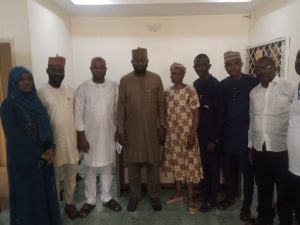

In a significant step towards enhancing transparency and accountability, the Kogi Adolescent Girls Initiative for Learning and Empowerment (AGILE) project has inaugurated a Grievance Redress Committee (GRC) to address grievances arising during the implementation of its educational programs.
 The inauguration event was led by the Project Coordinator, Dr. Abdulhakeem Bello, who reaffirmed the AGILE project’s commitment to empowering adolescent girls through education while ensuring fairness and responsiveness in resolving any arising issues.
The inauguration event was led by the Project Coordinator, Dr. Abdulhakeem Bello, who reaffirmed the AGILE project’s commitment to empowering adolescent girls through education while ensuring fairness and responsiveness in resolving any arising issues.
During his address, Dr. Bello highlighted the critical role of the GRC in safeguarding the success of the AGILE project by ensuring that concerns, challenges, and complaints from stakeholders are handled transparently, efficiently, and promptly.
“As we embark on this mission to empower young girls across Kogi State, it is crucial to have mechanisms in place to address grievances,” Dr. Bello said. “The establishment of this committee demonstrates our commitment to creating a safe, inclusive, and respectful environment for all. This platform will ensure that any concerns within the project are addressed fairly and in a timely manner, fostering trust and accountability.”
Dr. Bello further emphasized that contractors who deviate from the terms of reference in executing AGILE-related projects will face sanctions, including possible arrest and prosecution. He urged contractors to adhere strictly to the project guidelines, adding that lapses in project execution would not be tolerated.
The Grievance Redress Committee, chaired by Dr. Bello, includes Roseline Ozovehe (Secretary), James Sunday Moses (Member), Yahaya Ndambabo (Communication Officer), and Olatunde Michael (Member), the AGILE project’s Environmental Safeguard Specialist.
In her presentation, Roseline Ozovehe, the GRC Secretary, explained the importance of an accessible and inclusive grievance redress mechanism for project stakeholders. She noted that the system is designed to provide clear procedures for reviewing grievances and disputes in the communities where AGILE sub-projects are implemented.
“The mechanism will build trust with project beneficiaries and stakeholders, allowing communities to express concerns regarding project activities such as civil work quality and malpractice,” Ozovehe stated. “We are determined to ensure people use the system to communicate what is going well or poorly with the program.”
Similarly, the Environmental Safeguard Specialist, Olatunde Michael, stressed the potential environmental and social concerns that could arise during project implementation, such as noise, dust emission, waste management, and land use issues. He also underscored the importance of adhering to environmental and social frameworks, including the Environmental and Social Management Framework (ESMF), to mitigate these impacts.
Michael added that the AGILE project, sponsored by the World Bank, is focused on minimizing potential negative impacts while ensuring that grievances related to construction activities, community health, safety, and procurement processes are addressed effectively.
The newly inaugurated GRC aims to ensure that all grievances under the AGILE project, both at the State Project Implementation Unit (SPIU) and school levels, are resolved promptly. This initiative highlights AGILE’s commitment to enhancing the educational landscape for adolescent girls in Kogi State while maintaining a high level of accountability throughout the project’s implementation.
The committee’s work will be instrumental in fostering justice, equity, and collaboration between AGILE stakeholders, ensuring the project’s long-term success.
